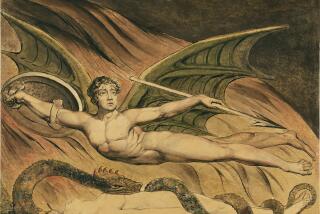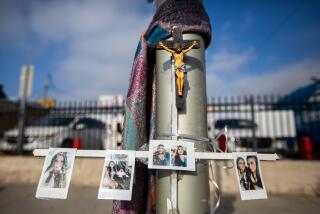Blake Offered $10,000 to Kill Wife, Witness Says
Actor Robert Blake devised four scenarios for “popping” his wife and offered to pay $10,000 to have her killed, a Hollywood stuntman testified Thursday.
Among the schemes allegedly proposed months before Bonny Lee Bakley was shot to death two years ago in Studio City was an ambush after the couple dined at a restaurant.
That was “just about what happened,” stuntman Gary “Whiz Kid” McLarty told the court on the second day of Blake’s preliminary hearing on murder charges in Los Angeles County Superior Court in Van Nuys. “He would eat dinner one night, go back to the car and then leave [the car], and that would give someone time to dispose of her that way. And then [he would] come back to the car.”
Prosecutors and police allege that after failing to persuade others to do the deed, Blake ended up pulling the trigger himself on May 4, 2001, after dinner with his wife at Vitello’s, a Studio City restaurant where the actor was a regular.
At the time, Blake told police that he had left Bakley alone in his car as he returned to the restaurant to retrieve a handgun. He said that when he returned, she had been shot.
Her death came 11 months after the birth of the couple’s daughter and five days after Bakley, 44, moved into a guest house on her husband’s property.
The relationship between Blake, who started acting as a child in “Our Gang” movies, and Bakley, who had a history of defrauding men and who ran a mail-order sex business, began as a one-night stand after they met at a Burbank jazz club.
Police allege that Blake had never forgiven Bakley for becoming pregnant and then wanted her dead so her could have sole custody of their daughter.
McLarty, considered key to the prosecution’s largely circumstantial case, was the second witness to testify that Blake had discussed killing Bakley with him. William Welch, a private detective and former Los Angeles police officer, testified Wednesday that Blake told him in October 1999 that he intended to “whack” Bakley if she would not have an abortion. Another stuntman, Ronald “Duffy” Hambleton, is scheduled to testify today and has told police that Blake also offered him money to kill Bakley.
Blake, 69, was arrested last year after a nearly yearlong investigation by the Los Angeles Police Department, and has been held without bail since.
The preliminary hearing will determine if there is enough evidence for Blake to stand trial for murder. Blake also faces charges of soliciting murder from the two stuntmen and conspiring with his co-defendant and bodyguard, Earle S. Caldwell, to commit murder.
Blake is charged with committing murder while lying in wait, a capital offense. Prosecutors said they are not seeking the death penalty. He faces life in prison if convicted.
A gaunt Blake -- whose once-dyed black hair is now a silver gray -- appeared so wobbly to Superior Court Judge Lloyd Nash in court Thursday that the judge urged him to ask for assistance if he needed it and offered to postpone the proceedings. Blake responded that sheriff’s officials had drawn enough of his blood to “float a battleship.”
“If they could find anything wrong, I’m sure they would, sir,” Blake said. “I’m all right. I promise you I’m all right, sir.”
Prosecutors on Thursday continued to buttress their case that Blake had been contemplating killing Bakley for some time.
McLarty, a broad-shouldered 40-year veteran of the stunt business, said he got a call to meet Blake at Du-Pars, a Studio City restaurant, in March 2001. Although he did not consider Blake a friend, McLarty said he knew him from working on the actor’s signature 1970s television series “Baretta” and thought the meeting would be about stunt-double work.
Invited back to the actor’s nearby home, McLarty said Blake told him about his troubles with Bakley.
“It was just a woman he had met somewhere at a bar and he had had intercourse with her and she was pregnant and now ... having the baby and beating him out of some money,” said McLarty.
After asking McLarty whether he had access to a silencer and showing him a gun, Blake walked him through the house, McLarty said.
“He started to show me how one might come in at night and literally bump her off,” McLarty said. “That somebody at night could come in ... while she was sleeping, and [he] showed me how to enter the house, and showed the stairway up to the bedroom where she slept, and [said] somebody could dispose of her.”
“What words did he use?” asked Deputy Dist. Atty. Patrick Dixon.
“He used ‘to go up the stairs and pop her,’ ” McLarty said.
McLarty also testified that Blake suggested more alternatives: having her killed in Laughlin, Nev., near the casinos where Blake said he could walk with Bakley, or along the highway heading back to Los Angeles.
“He would pull off the road somewhere and get out and relieve himself and a car could be following and could pull up and dispose of her that way,” McLarty testified.
“He said he wanted to pay $10,000,” McLarty said. Three days later when Blake called, McLarty said he told him, “That girl didn’t do anything to me,” and turned down the offer.
When Blake asked him why, McLarty said he told him, “Just your notoriety alone would be a problem.”
At that point, he said, Blake hung up and they never spoke again. Five days after Bakley’s death, McLarty said he went to the LAPD’s North Hollywood station to give his account because it had been “eating inside of me.”
For most of the afternoon, Blake’s defense attorney, Thomas Mesereau Jr., cross-examined McLarty about his fatal shooting of a housemate a decade ago and contradictions in his first statements to police.
McLarty had been a key witness in the 1986 involuntary manslaughter trial for three deaths on the set of the “Twilight Zone” movie, although Nash ruled any questions about his involvement in that case would be irrelevant.
Mesereau attempted to portray McLarty, who struggled to remember some details during his testimony, as a violent drug addict who had lied to police a decade ago when he shot and killed a 49-year-old ex-convict living at his house. After initially lying to police and instructing a friend to cover for him, McLarty confessed to shooting the man six times with a borrowed .357 magnum.
He was eventually cleared of any criminal charges when authorities ruled the shooting an act of self-defense.
After Thursday’s testimony, Mesereau said he believed McLarty “broke down as a witness” and said he thought the “prosecution is worried about it.”
“We’re just going to keep chipping away at their credibility, exposing their problems, exposing what a weak case this is,” said Mesereau, the third attorney to represent Blake in the case.
In other testimony, LAPD Det. Ronald Y. Ito, the lead investigator on the case, said he found a child-custody agreement among the papers seized from Blake’s home the day after Bakley was killed. The terms required the couple to marry no later than Oct. 5, 2000, and stipulated that, if Blake divorced Bakley, he would lose custody of his beloved daughter Rose, who is 2 years old.
Letters confiscated by police also offer insight into the couple’s turbulent relationship.
One begins with Bakley apologizing to Blake for getting pregnant and another reiterates her wish to marry Blake. In a third letter, written after Bakley sued Blake for paternity, she wrote, “I’ll withdraw the suit and forfeit any support if you will marry me.”
Her family and friends have said that marrying a celebrity had been a lifelong ambition of Bakley, who has grown children from a previous marriage.
Blake married Bakley after she gave birth to a baby girl in June 2000.
In addition to determining whether the case should go to trial, at the close of the expected two-week hearing, Nash will reconsider Blake’s bail motion. The actor could be released on bail if the “lying in wait” charge is dismissed, as his defense attorneys are seeking.
*
Times staff writers Megan Garvey and Errin Haines contributed to this report.
More to Read
Sign up for Essential California
The most important California stories and recommendations in your inbox every morning.
You may occasionally receive promotional content from the Los Angeles Times.










